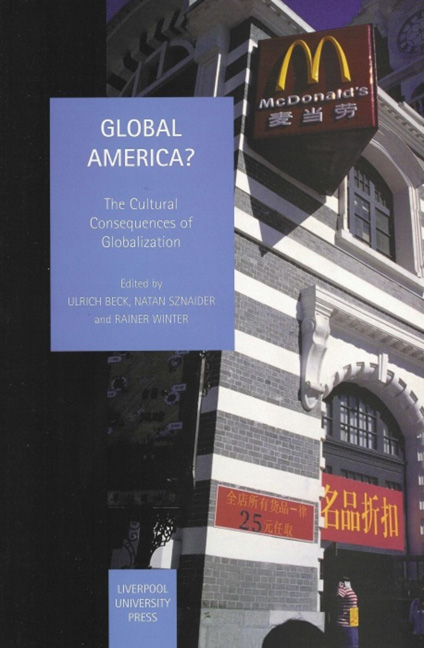Book contents
- Frontmatter
- Contents
- List of Contributors
- Acknowledgments
- Introduction
- PART I THEORETICAL PERSPECTIVES
- PART II NATIONAL CASE STUDIES
- PART III TRANSNATIONAL PROCESSES
- 8 Techno-Migrants in the Network Economy
- 9 The Americanization of Memory: The Case of the Holocaust
- 10 From the Lisbon Disaster to Oprah Winfrey: Suffering as Identity in the Era of Globalization
- 11 Global Media, Cultural Change and the Transformation of the Local: The Contribution of Cultural Studies to a Sociology of Hybrid Formations
- 12 ‘Rockization’: Diversity within Similarity in World Popular Music
- 13 The Internet: An Instrument of Americanization?
- PART IV EPILOGUE
- Rethinking Americanization
9 - The Americanization of Memory: The Case of the Holocaust
from PART III - TRANSNATIONAL PROCESSES
- Frontmatter
- Contents
- List of Contributors
- Acknowledgments
- Introduction
- PART I THEORETICAL PERSPECTIVES
- PART II NATIONAL CASE STUDIES
- PART III TRANSNATIONAL PROCESSES
- 8 Techno-Migrants in the Network Economy
- 9 The Americanization of Memory: The Case of the Holocaust
- 10 From the Lisbon Disaster to Oprah Winfrey: Suffering as Identity in the Era of Globalization
- 11 Global Media, Cultural Change and the Transformation of the Local: The Contribution of Cultural Studies to a Sociology of Hybrid Formations
- 12 ‘Rockization’: Diversity within Similarity in World Popular Music
- 13 The Internet: An Instrument of Americanization?
- PART IV EPILOGUE
- Rethinking Americanization
Summary
Almost 300 years ago, John Locke began his political investigation into the nature of modernity with the statement, ‘Once, all the world was America’. At the turn of the millennium, I would like to ask if we are returning to the point at which all the world is becoming America again. The purpose of this chapter is to present the distinctive form that collective memories take in the age of globalization. My focus will be on the American case and the particular significance of Holocaust memory, or what is often called ‘the Americanization of the Holocaust’.
Over the 1990s the concept of ‘globalization’ and with it, of course, ‘Americanization’ has caught the attention of public discourse regarding the prevalence of consumption and popular culture. Anxieties over the global in our time replay similar anxieties regarding Americanization just a century ago. Then and now, the theme of a ‘global culture’ has become the subject of political, ideological and academic controversies. Many of these debates are framed in dichotomous terms, juxtaposing national and post-national models: the former perceives globalization as a shallow replacement for national values. These so-called ‘national values’ are often called ‘authentic’ in times of postnationality. The emergence of mass consumption has played a major role, since the existence of transnational modes of identification is often equated with the imminent end of the nation. Consumption patterns across nations are interpreted as leading to global homogenization. Thus, in the anti-modernist mind, America stands for everything evil: soullessness, alienation, loneliness, a hell of egoism. Something more than the consumption of food, clothes and other goods is at stake here, however. One of the dramas of this process is played out in the relationship between globalizing processes and the politicalcultural foundations for new forms of collective memory – the consumption of memory, so to speak. What has emerged is a distinctive type of collective memory that transcends the confines of the nation state without necessarily replacing national memories. This form of memory is global, because it refers to memories that are shared and disseminated by a particular group of people whose claims for collective identities are no longer articulated in particularistic national terms but rather universalistic global terms. Here again the role of America is crucial.
- Type
- Chapter
- Information
- Global America?The Cultural Consequences of Globalization, pp. 174 - 188Publisher: Liverpool University PressPrint publication year: 2003



